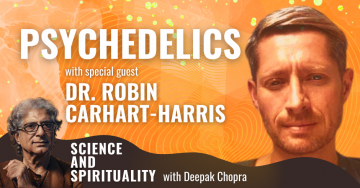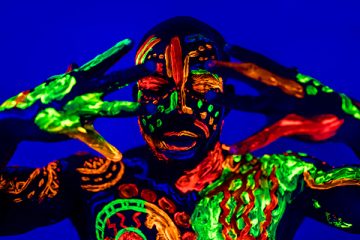Home › Podcasts › Science and Spirituality with Deepak Chopra › Psychedelics – Beyond The Trip With Special Guest, Dr. Robin Carhart-Harris
Psychedelics – Beyond The Trip With Special Guest, Dr. Robin Carhart-Harris.

Today’s episode explores the potential of psychedelics in various aspects of mental and physical health, from treating depression to confronting death anxiety. Deepak Chopra shares some personal stories about his experiences in the areas of consciousness exploration and psychedelics, while Dr. Robin Carhart-Harris shares scientific findings which give hope to the revolution of our current healthcare system.
Listen to the podcast here
Psychedelics – Beyond The Trip With Special Guest, Dr. Robin Carhart-Harris
A conversation with Deepak Chopra and Dr. Robin Carhart-Harris on the science and research into psychedelics and its hope for health and healing.
It’s my privilege to have a very special guest. I’ll tell you a little bit about him, and then we’ll all learn a lot from him. We are continuing these conversations with what I call a motley group of sages, scientists, psychotics, and geniuses. You’ll have to decide which category this conversation fits into. It’s my great pleasure to invite Robin Carhart-Harris, a Professor at UCSF where I also teach at the medical school.
‐‐‐
It’s a great privilege to have you as a colleague as well. I have been following your work, Robin. I’m a big fan. I watched all your videos. I looked at your TED Talk. I looked at some of the papers you’ve published. I am very grateful that you can join this conversation.
Thank you. It’s an honor and privilege to be here with you.
Thank you. Let me tell you very briefly. In 1966 in a medical school in India, All India Institute of Medical Sciences, I was part of a controlled experiment with LSD from Harvard Medical School. There were several medical students who were given a placebo. I happened to be in the LSD group. In ‘66, probably way before you were born, I got into this field. Periodically, I have stayed in touch with the researchers in this field.
I’m in New York where I work with a neuropsychiatrist called Gita Vaid. She’s from Oxford. We do a lot of protocols involving psychedelics and terminal care, psychedelics and depression, psychedelics and immersive experiences, psychedelics and VR, psychedelics and guided meditation, etc, so I have a bit of a background. Having looked at all your work, I’m in awe of the contribution you’ve already made in this field. Once again, thank you.
Dr. Robin’s Career Path
I read a little bit about your history and your background. Share with our audience who’s a lay audience. They do not understand science. Although, I’d like to get into the science, serotonin, agonism, and default mode network. Share with our audience who have no knowledge of science what you think the promise of psychedelics is and why you are so immersed in it. I saw from looking at the videos that you are also very interested in what I would call the heart problem of consciousness. It’s all yours for the next few minutes, and then I’ll maybe occasionally interrupt to ask you questions. Go ahead.
Thank you, Deepak. In a sense, you could go straight into the name itself, psychedelic. These are the compounds that I study and that I hoped to study back in the early to mid-2000s when I discovered a book by Stanislav Grof called Realms of the Human Unconscious. I was studying psychoanalysis at the time and enjoying that.
I was also experiencing some ambivalence because, I suppose, in a pragmatic, positivist way, I wanted it to be more concrete. I wanted to be able to test some of the principles of psychoanalysis in a more concrete way and demonstrate its validity. I sensed that it had really strong explanatory power, but I was somewhat frustrated at its lack of scientific rigor in its methodology. I then found this book, Realms of the Human Unconscious, that suggested that LSD could reveal the unconscious mind and make it manifest to conscious awareness. This was a light bulb moment for me. It really changed my life, finding that book and reading that book. I knew that that’s what I wanted to study.
I said I’d go straight to the name psychedelic and I danced around it, but psychedelic is meant to denote the key property of these compounds, which is to reveal the psyche and make the psyche manifest. I suppose by implication there, that would say that the psyche ordinarily isn’t fully manifest. There are aspects of it that aren’t available to conscious awareness. Through the action of these compounds, those aspects can be made available.

Psychedelics: Psychedelic are the compounds that reveal the psyche, to make the psyche manifest.
That was the chosen term of Humphry Osmond in conversation with Aldous Huxley in the mid to late 1950s. Osmond came up with this term and mostly, it’s stuck, and I’m glad it has. When people hear the etymology, they know that it’s speaking to what I believe is a principle action of these compounds and what they do, which is the principle property.
All About Psychedelic
What does the term exactly mean?
Psyche, the most literal translation would be soul. We tend to think of it as the mind, but it’s deeper than that. The ancient Greek term refers to the soul. The delic derives from delos, which means to make visible or to make manifest. To make the soul manifest or to make the soul visible is probably the most literal translation of psychedelic.
Let’s go directly from there, make the soul manifest. As an aside, I have been a colleague of Stanislav Grof as well and he’s a great friend. He’s amazing in his contribution to our understanding of what we are calling the soul, consciousness, or awareness. I sense that you are sympathetic to this idea. In Eastern wisdom tradition, when a child is born, it has something called pure consciousness, which means it’s not been contaminated yet by social constructs, economic constructs, historical constructs, or religious constructs.
The expression of innocence in a child is one of curiosity, wonder, playfulness, joy, and friendliness. A child is the perfect embodiment of innocence without the conditioned mind. There’s a phrase in India, “Every child that is born is proof that God has not yet given up on human beings.” Looking at what you’ve been seeing in some of your videos, perhaps the most important contribution of psychedelics is to bypass or, for the moment, go beyond the conditioned mind.
We return to that original state of innocence, which is not only innocence but is also combined with curiosity and creativity. Therefore, creativity can also be unleashed as a result of going beyond the conditioned mind and you being the science behind it. I would love to hear from you about default mode network, serotonin, and agonism, which I’ve been reading, in fact, as a lot of your contributions.
We do know to an extent what these classic psychedelics do in the brain. We know that they work on the serotonin system, a really important neuromodulatory system that tunes the brain in particular ways. Serotonin does a lot of stuff. In fact, most serotonin is outside of the brain. 90% plus is in our gut. In the brain, it does some important stuff. No doubt, it does important things in the gastrointestinal system. In the brain, it’s involved in mood, cognition, sleep, and conscious states.
We know that psychedelics stimulate a certain serotonin receptor. These receptors are like locks. If serotonin’s the key, they’re like locks that when unlocked will tune brain function in different ways. There are loads of these serotonin receptors. Serotonin is a really complex system involved in a lot of different things. We know with a pretty good degree of precision and confidence that a particular serotonin receptor called the serotonin 2A receptor is a critical component of the action of psychedelics.
A long story short, when you stimulate these receptors, which are heavily expressed in the cortex, then it gets more interesting. They’re heavily expressed in the most evolutionary recent cortex, which humans have so much of. It’s what sets us apart as especially weird animals. When you stimulate these 2A receptors in this recent brain, if you want, it disregulates the activity there. It has what I’ve described as an entropic action. It excites these regions and the cells within them, but it does so in a way that disregulates their function. It makes their activity, at least in the cortex, less predictable, more disordered, and more random.
It’s because of that that I believe that it allows an opportunity, long story short, for relearning or major shifts in perspective to get out of the conditioned mind. That is likely to be encoded, especially by the recent cortex, the recent brain, or the human brain, if you want, that conditioned mind. That’s who you are, your ego, and so on. It is encoded in that particular aspect of the brain. It’s that particular aspect of the brain that’s dysregulated or scrambled up in a sense under the action of the psychedelics.

Psychedelics: Psychedelics allows an opportunity to relearn and experience major shifts in perspectives to get out of the conditioned mind.
Impact On The Gut
Since you mentioned Aldous Huxley, and, I’m getting on 76 years and have met all these people occasionally, Laura Huxley, who is his widow, was a very close friend of mine. She regaled me with a lot of stories about Aldous Huxley, Brave New World, and all the experiments they did together, along with other people like Bob Thurman and Richard Alpert who was originally kicked out with Timo Leary. I became friends with Timo Leary’s former wife who married Richard Alpert who then became Ram Dass.
I have some questions based on what you said. Incidentally, in the ‘70s, I was training with Seymour Reichlin at Tufts University. After I’d finished my residency and training in Neuroendocrinology, I was with Seymour Reichlin who’s 97. At that time, he was the President of the Endocrine Society. He lives in Arizona. Every year, he comes to NYU here and does a short sabbatical. He still argues with me about the heart problem of consciousness. If he finds a snake in his garden at the age of 97, he looks for receptors.
In the 1970s, I was his fellow. We were looking at all these molecules, serotonin, dopamine, opiates, oxytocin, and something called anandamide. One of our colleagues at that time who was training at Georgetown, Candace Pert, was the discoverer of the opioid receptor. We were looking at these neurotransmitters in the 1970s. One day, she made the comment, “These are molecules of emotion.” I said, “Why don’t you write a book on that?” She did. I wrote the introduction. It became a huge best-seller.
Her boss got the Wolf Prize for her contribution to opiate receptors even though she had discovered them. That’s the usual story. She passed away, and in the end, she was acknowledged as the discoverer of the opioid receptor. I’m curious what your thoughts are since the neuroendocrine axis and neuroectoderm are both the gut and the brain, is there any reason not to suppose that these psychedelics that you’re talking about, that increased serotonin and agonism, could do that also through the gut, not just through the brain?
Yes. In fact, it looks like they do. There’s certainly a lot of serotonin receptors in the gut. There’s some early research looking at LSD on sheep intestines and its vascular action. It was there that they found that LSD constricted the blood vessels in the sheep intestine. This was one of the early findings that LSD could be vasoconstrictive.
The origin of the term serotonin was linked to the vascular action of that chemical. It was found in the serum in the blood and it affected the tone of the vessels. Hence, serotonin. This vascular action and how that’s going to affect gut motility is part of the picture. We, personally speaking as well, can be quite brain-centric in our approach to these compounds or in our approach. It may well be that we are missing some tricks outside of the brain. Not to go to the rest of the body in isolation, but to look at the body-to-brain coupling and how they interrelate is a particularly interesting area for the research to go in.
You are an academic. You’re a scientist. You said you are brain-centric. You bring out the details of what is happening in the body. As a trained neuroendocrinologist, I’m very interested in that aspect of psychedelics. When it comes to language, there is a whole body of language in Eastern wisdom traditions that does not separate what we call the autonomic nervous system from the brain. The sympathetic nervous system and the parasympathetic nervous system.
In fact, I’m holding a book in my hand on what is called the polyvagal theory. I talked to these scientists who have become interested in the Eastern perspective. The Eastern perspective is the Eastern wisdom traditions perspective, the Ayurveda perspective, which is a healing modality, and the yogic perspective. They all combine. The brain, the parasympathetic nervous system, the nerve, and the autonomic nervous system, including the sympathetic nervous system, are one system.
In yoga, what we call this subconscious mind is called the supraconscious mind. You’re monitoring everything without your conscious control. You and I are doing nothing to regulate our blood pressure, our endocrine system, self-regulation, homeostasis, or anything of the sort. It’s supraconscious rather than subconscious.
The yogis train themselves to bring the subconscious to the conscious level or the supraconscious so we can influence directly vagal tone through various procedures, breathing exercises, yoga, toning, and many other things. We understand the anatomy of the polyvagal theory. We can bring to conscious awareness what’s happening in the so-called subconscious mind, which we call supraconscious. We can train the autonomic nervous system to listen to our instructions because we can go to that deep level of awareness.
What is becoming very clear in that aspect is that the mind that we call conscious is the least conscious. What we call the subconscious is the most conscious because it’s eavesdropping on everything that’s happening in your body. Psychedelics are opening the window to the unity between what we call the brain, the autonomic nervous system, and the rest of the body. When we combine all the reductionist understanding of what’s happening in the brain, we can look for it elsewhere in the body because it’s a unified process.
I’d like to think that’s a direction that at least some cognitive neuroscientists are taking to better appreciate the interrelated nature of the brain to the body. In the context of psychedelics, their effect invites that kind of holistic perspective. Also, in psychiatry, it invites a holistic perspective on mental health that isn’t so biocentric.
The past couple of decades in psychiatry have been very biocentric arguably now more than ever. Through psychedelics, it invites more of a holistic biopsychosocial approach to mental health. These multiple systems, scales, and interactions between systems, scales, and aspects of experience are a direction of travel that I welcome. It’s invited by the phenomenology of the psychedelic experience.
Tweet: Now more than ever, psychedelics invite more of a holistic biopsychosocial approach to mental health.
Addressing Chronic Physical Diseases
I have two more comments and then I want to ask you specific questions and your take on it. Our foundation is called TheChopra Foundation, which is a 501(c)(3). We do a lot of meta-analysis and research. We were looking at all the people who were getting sick during the pandemic. The older ones were with all this chronic illness and all that. The younger ones were having what we call cytokine storms or inflammatory storms, but they all had sympathetic overdrive.
We have a librarian who used to work for Wikipedia. We did this meta-analysis that almost everyone with chronic illness has depression, anxiety, and inflammation preceding chronic illness sometimes by several decades. To look at biology and psychology as two different things doesn’t make sense anymore. Whatever happens in the body affects the psyche. Whatever happens in the psyche affects the body. They have to be one thing, whatever that one thing is. Otherwise, I wouldn’t be able to lift my arm. It starts with a thought and ends up with a biological response. Whatever it is, it has to be one unit. Otherwise, it violates all the laws of thermodynamics. Given that, I’m going to ask you short questions and your opinion on psychedelics and chronic disease.
Physical disease, or do we not make that distinction?
I’m asking about chronic physical diseases, like diabetes, metabolic syndrome, autoimmune illness, and cancer.
We did a bit of population-level analysis on cardiovascular disease and diabetes. We did find something that was positive in relation to lower rates in people with some recent history of psychedelic use. There have been a few of these population-type analyses looking at different things like mental health in disease like psychological distress and how they’re lower in people who report a recent history of psychedelic use. We have seen something there. It speaks to the mind and brain-to-body coupling and the challenge to the splitting of those systems as distinct things.
There are intriguing possibilities. There is also inflammation. There are some reasons to think that the action of psychedelics could counter the processes of inflammation. Quite what the mechanisms are, they’re not clear, but they could involve the aspect of the pharmacology of the psychedelics acting on the serotonin system. There are a lot of intriguing angles there.
There are studies looking at neurological disorders with psychedelics as well as the research. There is a lot of research happening in psychiatry looking at psychedelic therapy for depression, addiction, and so on. They’re also looking at Alzheimer’s and Parkinson’s. I want to put a little caveat there that there’s no compelling evidence of a reduction in core markers of pathology in those neurological disorders as yet. Those studies are proposing to treat more of the psychiatric ancillary symptoms or extra symptoms that go along with the neurological disorder. That work is happening. It’s an exciting time because we’ll see what comes out of it.
That’s very helpful because I get a lot of queries on psychedelics, neurological diseases, Parkinson’s, ALS, and all that. You think that’s an area of promise.
It’s worth looking at. I’m wearing my cautious scientific hat. We’ll wait and see what comes through in terms of the evidence.
Dealing With Mental Issues
This is the next question. Psychedelics and depression, you’ve already answered that, but how about psychedelics, depression, suicidal ideation, existential anxiety, and so on?
The evidence is quite compelling. I believe it will grow. The compelling nature of it will become clearer over time. We did a study in 2023 which was published in the New England Journal of Medicine showing that psilocybin therapy is at least as effective and probably more effective than first-line treatments for depression drug treatments at the moment.
The remission rates, meaning you don’t have depression anymore, were twice as high in the psilocybin therapy group compared to a selective serotonin reuptake inhibitor. It was a classic antidepressant drug called escitalopram. It’s very promising. I believe that there is solid science to this promise. It’s not hype. The action is a more holistic action with the psychedelic opening up the psyche and being combined with supportive psychotherapy. It’s that combination of direct drug action but also supportive psychotherapy that seems to be getting people better.
In that context also, I wanted to share something with you. Our foundation is very heavily invested in supporting research and also bringing some solutions to suicidal ideation in teenagers. The 2nd most common cause of death in teenagers is suicide, the 1st being accidents which are related to drug abuse as well. A few years ago, we created an emotional chatbot named after an English French recording artist who died of suicide. This is an AI that speaks to teens. Interestingly enough, our emotional chatbot has intervened in 6,000 suicidal ideations and is having 20 million conversations simultaneously. Since she’s an AI, she can speak to everyone simultaneously instantly.
We are having amazing results with emotional AI for PTSD amongst veterans where psychedelics also have an improvement. We are also having amazing results with teens. The reason I’m asking you this question is if somebody is in their teens and is responsive to these emotional AI interventions or deep learning systems, do you think there’s a role for either microdosing or psychedelics as an adjunctive treatment for teen depression and teen suicidal ideation? This is a very important question because I’m asked this all the time.
It is a very important question because early mental health is the most reliable predictor of adult mental health. What’s happening during that critical period is critically important. If young people are developing mental illnesses, then there’s a strong argument to intervene to try and deal with that early so that they can live a fulfilling adult life. They’re vulnerable. There’s risk, but also, there’s promise, hope, and such good reason to try and intervene at that stage. When framed in that way, you can think about being bold about intervening.

Psychedelics: Early mental health is the most reliable predictor of adult mental health. Any issue happening during this critical period must be intervened to secure a fulfilling adult life.
Many young people, teenagers, are prescribed medications that are quite blunt tools for treating mental illness that come with side effects and could impact development in complicated ways that might not always be so helpful. If there are alternative interventions that don’t involve people being on drugs all the time, then you use medicine to catalyze a process like an important psychotherapeutic process or a relearning process. Your AI bot, I imagine, is working on people’s cognitive biases that say they’re worthless or that life isn’t worth living and inviting them to correct maybe those biases. That relearning mechanism could, in theory, be catalyzed by a low dose of a psychedelic.
You are open to that kind of investigation and working with teens in this area as well.
We should be. We’ve done some preliminary analysis looking at data that we collected through prospective questionnaires, tracking people over time. In our sample, which was quite big, we could look at adolescents selectively, and we did. We looked to see whether they are the same as the rest of the population in terms of how they respond to psychedelics. Mostly, they are. The general principle is that we see improvements in the disease of mental health.
There were some subtle differences, which I’ll briefly raise. Typically, in adults, we see that if people rate ego dissolution during the drug experience, that is a positive predictor of positive improvements in mental health. In the younger cohort, that rule wasn’t so strong. One of the reasons that we intuit is that their egos are developing at that age. That speaks to the special vulnerability at that age for at least big doses of psychedelics having this ego dissolution effect when their egos aren’t matured. There are pluses and minuses to having a mature ego, but we can accept that it’s a period of some instability in terms of ego development and perhaps some special risk of having an ego-destabilizing drug at that age. Special risk, special opportunity, it depends on what you do with that.
Application On Terminal Care
Unfortunately, most egos aren’t healthy and mature even in adults, so there may be a role there. Thank you for answering that question. One of my final questions is that I’ve been also interested for a long time in something called terminal lucidity. I’ve asked my neuroscience colleagues if this is a real phenomenon, terminal lucidity. Some people, not all, 5% maybe, even when they have Alzheimer’s or sometimes even on a ventilator, before they die a few minutes or a few days, they have extreme clarity and lucidity. I never believed in the phenomenon without having seen it, but then I called my neuroscience colleagues and they say some of them are very interested in that.
I’ve sat with my neuropsychiatrist MD with some people in the last stages of life. Particularly, one example was my own literary agent who has worked with me for 35 years. She was very close to me as a family. I’ve written 95 books and she helped me with a lot of them. She was dying of brain cancer. I sat with her during a ketamine session and she had such clarity and joy at that experience. She was not at all afraid of transitioning from this life to the next or whatever that dimension is, if any. What do you think of psychedelics and terminal care, especially terminal care with compassion which a lot of patients don’t get?
Some of the most compelling human research that has been done with psychedelics in the past couple of years has focused on anxiety and depression in relation to terminal diagnoses, the dying process, and the closer prospect of dying. With the likes of Roland Griffiths on the Johns Hopkins team, Stephen Ross and others at NYU, and Charlie Grob at UCLA, there’s some fantastic work in this area looking at psilocybin therapy for end-of-life anxiety. It’s very promising. It’s human. Maybe somewhat sadly, it hasn’t been picked up by medicine regulators in the way that psychedelic therapy is for depression and PTSD. They don’t recognize it as a diagnostic category. They’re like, “What is fear of dying? That’s a universal human thing.” Does it have to be?
Tweet: When your life is close to ending, the ego will rage against the dying light. Psychedelics can help here through their ego-dissolving actions, showing the living being that death is not something to be scared of.
I read Timothy Leary when he was given his terminal cancer diagnosis. Perhaps in typical Leary-esque style, he said he was thrilled and he was going to throw a death party. You might say he is using humor as an escape mechanism or defense mechanism there, but it is funny. Other cultures have a different approach to dying. The way Buddhism looks at the dying process can be very healthy. There’s more good work to be done in that space.
You do encourage that.
People can ensure the mechanism. When your life is close to ending, the ego will rail. It will rage against the dying light. It doesn’t want to go. It’s a natural and human reaction. To invite that letting go and to have the psychedelic and its ego dissolving action show the individual the living being that it’s not something necessarily to be so scared of is very powerful.
Important Links
- Robin Carhart-Harris
- Realms of the Human Unconscious
- Brave New World
- Anchored: How to Befriend Your Nervous System Using Polyvagal Theory
- https://NeuroScape.UCSF.edu/profile/robin-carhart-harris/
- https://www.Facebook.com/profile.php?id=100063850204479
About Robin Carhart-Harris
Robin Carhart-Harris moved to Imperial College London in 2008 after obtaining a PhD in Psychopharmacology from the University of Bristol, focused on the serotonin system, and an MA in Psychoanalysis from Brunel University, 2005.

Robin has designed human brain imaging studies with LSD, psilocybin, MDMA and DMT, a clinical trial of psilocybin for treatment-resistant depression, a double-blind randomized controlled trial comparing psilocybin with the SSRI, escitalopram, for depression, published in the New England Journal of Medicine, and a multimodal imaging study in first time users of psilocybin. Robin has published over 100 scientific papers.
He founded the Centre for Psychedelic Research at Imperial College London in April 2019, the first of its kind. In 2021, he was listed in TIME magazine’s ‘100 Next’, a list of 100 rising stars shaping the future. Also in 2021, he moved to University of California, San Francisco, becoming the Ralph Metzner Distinguished Professor in Neurology and Psychiatry. At UCSF, Robin serves as Director of the new Psychedelics Division within the translational neuroscience Centre, Neuroscape.

